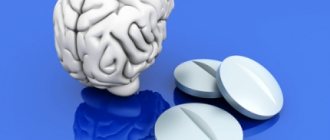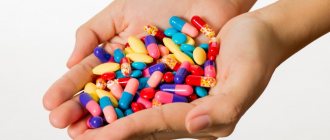There are many myths about depression treatment and antidepressants. We have already dispelled some of them by answering the most common questions about antidepressants. But what if you're worried about their side effects? In this case, Dr. David Burns offers a cautionary tale and some practical advice.
All medications prescribed for depression, anxiety, and other mental illnesses can cause side effects. For example, taking older drugs (amitriptyline) can sometimes cause dry mouth, drowsiness, dizziness, weight gain, etc. Many antidepressants (such as fluoxetine) can cause nervousness, sweating, upset stomach or loss of interest in sex, as well as difficulties with achieving orgasm.
However, it is useful to consider that patients taking only placebo drugs during studies tend to report numerous side effects. This is because they think they are taking real medicine.
Symptoms of depression
It is important to distinguish between severe and mild forms of depression. Major depressive disorder (MDD) is characterized by depressed mood most of the day and loss of interest in normal activities and contacts; these symptoms are present every day for at least two weeks.
Dysthymia is a chronic but milder form of depression that lasts at least two years. It is a constant feeling of depression, but less debilitating than MDD.
(Eeyore from Winnie the Pooh is one of the best examples of dysthymia in our pop culture.) The main symptom is feeling sad, gloomy, or depressed most days of the week. Other signs include low energy and fatigue, feelings of hopelessness, too much or too little sleep, low self-esteem, trouble concentrating, loss of appetite or frequent overeating.
How long will it take before I feel better?
It usually takes at least two to three weeks before your mood begins to improve under the influence of an antidepressant. Some medications take longer. For example, the effects of Prozac may take five to eight weeks to occur. It is not known why the effects of antidepressants may be delayed for so long (whoever finds out the reason has a good chance of being nominated for a Nobel Prize).
Many patients feel the urge to stop taking antidepressants before three weeks have passed because they feel hopeless and believe the medication is not working. This is counterintuitive because the active ingredients do not immediately produce results.
For what diseases and problems are antidepressants prescribed?
Currently, the range of use of antidepressants in medical practice is very wide. They are used not only to treat depression itself, but also for a number of other mental illnesses, syndromes and disorders.
This is explained by complex disturbances in the functioning of the central nervous system that accompany many pathologies. Almost every antidepressant has its own advantages and disadvantages.
A qualified specialist can combine these drugs with other medications to achieve a good therapeutic effect.
Most often, antidepressants (alone or as part of complex therapy) are prescribed for the following diseases:
- depression;
- neuroses;
- panic attacks;
- schizophrenia;
- various psychoses.
It should be noted that in each individual case a specific drug is used. That is why self-treatment of these pathologies even with weak antidepressants can lead to unpredictable consequences.
Depression
Is it possible to treat depression without antidepressants?
Vegetative-vascular dystonia (VSD)
is not considered by many experts as a separate disease, since its manifestations can be very diverse and difficult to classify. The disease usually comes down to a nervous disorder, in which sudden changes in blood pressure, periodic pain, urination problems, sudden changes in heart rate and breathing are most often observed,
. A sudden attack can trigger a panic attack in the patient. Currently, many neurologists recommend prescribing antidepressants to patients with similar problems as one of the main medications as part of complex therapy.
The following groups of antidepressants are most effective for VSD:
- selective serotonin reuptake inhibitors (SSRIs);
- some tricyclic antidepressants;
- tetracyclic antidepressants.
The course of treatment lasts from several weeks to several months. The patient must regularly visit a specialist who will evaluate the effectiveness of the prescribed drug. With cardiovascular (
) form of VSD there is a risk of temporary deterioration of the condition due to the side effects of the drug. In this regard, you cannot take antidepressants to treat VSD on your own. The drug and dose are selected by a qualified specialist.
Polyneuropathy
Polyneuropathy is a very serious problem in which patients' peripheral nerves are affected for one reason or another. This can be accompanied by very severe pain, sensory disturbances, and in severe cases, motor disorders (
). Treatment of this disease should be comprehensive, aimed at both eliminating the cause of the disease and combating its manifestations.
Some antidepressants are widely used as symptomatic treatment for diabetic polyneuropathy. In particular, amitriptyline and venlafaxine relieve pain more effectively than many traditional painkillers (non-steroidal anti-inflammatory drugs).
The effectiveness of antidepressants for polyneuropathy is explained by the following mechanisms:
- dulling of pain occurs at the level of the nervous system;
- the serious condition of patients with advanced diabetes mellitus is often accompanied by depressed mood and depression (which are also relieved by antidepressants);
- It is almost impossible to eliminate the root cause (nerve damage itself) in diabetes, and pain must be constantly dealt with, and antidepressants are designed for long-term use.
Thus, the use of antidepressants in the treatment of polyneuropathy is justified and effective. Before starting treatment, it is better to discuss the choice of drug and dose with specialized specialists (
Neurosis
Panic attacks
Panic attacks are acute nervous disorders that can manifest in different ways. It is currently believed that cupping (
) panic disorder can be successfully treated with antidepressants. Typically, this initial stage of treatment lasts several weeks. During the period of consolidation of the result, antidepressants are combined with other drugs and
, and the full course of treatment can last more than a year.
Causes of the problem
The drugs are not addictive. However, when they are taken, a kind of adaptation of the nervous system to new operating conditions occurs. This is what causes the development of withdrawal syndrome when stopping the use of antidepressants, and the duration of their use plays an important role. With a constant inhibitory effect on the nervous system, the risk of developing unpleasant consequences increases. The active substance is excreted from the body, but neurons are unable to compensate for the decrease in their concentration in a timely manner, which causes the development of the clinical picture of withdrawal syndrome. Since the prescription of such drugs is used for symptomatic purposes, there is no need for their constant use. Therefore, doctors try to avoid long courses of antidepressants. It is important to stop taking such medications correctly, so supervision by an experienced doctor is required. Taking medications on your own, as well as exceeding the prescribed dosage, is not recommended.
The pathogenesis of antidepressant withdrawal syndrome has not been fully studied to date. There are only a few hypotheses that could explain the development of illness in response to cessation of the use of such drugs. It is reliably known that drugs in this group are not addictive and do not lead to addiction, unlike narcotic substances. The highest incidence of withdrawal symptoms upon termination of antidepressant use was recorded with the use of serotonin reuptake inhibitors. The use of these drugs provokes an increase in the level of neurotransmitter concentration with simultaneous inhibition of the regulation of the functioning of synaptic membranes in the nervous system.
Presumably, the main reason for the development of withdrawal syndrome is the insensitivity of neurons to the effects of chemicals involved in impulse transmission. At the same time, refusal to use antidepressants is associated with a long-term decrease in the concentration of one’s own serotonin and other structurally similar compounds produced by the body. The combination of these processes leads to the formation of persistent manifestations of withdrawal, which after several days or weeks normalize on their own.
Depression in women
According to the Centers for Disease Control and Prevention, about 10% of adults in the United States today suffer from depression in one form or another; and the National Institute of Mental Health finds that up to 25% of adults experience major depression at least once in their lives.
Women are twice as likely to experience depression as men, and there are many theories as to why this happens. These include hormonal fluctuations (during the menstrual cycle, pregnancy, perimenopause and menopause), genetic factors and work overload (due to combining work and household responsibilities).
Another theory suggests that women's way of thinking plays a role - namely, the tendency to delve into problems, whether this habit is innate or developed over time.
Treatment of depression: psychotherapy, exercise, proper nutrition
When medications provide initial relief from depressive symptoms, many experience a surge of energy that allows them to take a more active role in their own recovery. This may include psychotherapy in the form of cognitive behavioral therapy (which focuses on how your thoughts and behavior affect depression and other feelings) or interpersonal therapy (which aims to help the patient understand how relationships with loved ones affect depression).
Today, the most effective treatment for depression is antidepressants along with psychotherapy, and each of these two components in combination with each other produces a more powerful effect than alone.
It's also important to change your habits to support your mood control efforts. This includes maintaining a good sleep schedule and regular exercise.
Experts from Duke University found that regular exercise relieves depression as well as antidepressants and keeps it in remission after a year. What's more, just one half-hour of aerobic exercise can boost energy levels and reduce fatigue, according to a 2013 study from the University of Georgia.
A healthy diet also gives you strength. Consumption of foods higher in fat and sugar exacerbates daytime sleepiness and/or lack of energy, while a diet rich in complex carbohydrates (eg, whole grains, fruits and vegetables) and lean protein (eg, skinless poultry, fish, seafood) , eggs, beans and legumes), increases vigor and energy reserves during the daytime.
Polyunsaturated (omega-3) fatty acids found in fish, flaxseeds, walnuts and other foods have also been shown to ease depression, according to some studies. Remember to drink plenty of water throughout the day and avoid alcohol if you are depressed.
Now a word to the pessimists: depression is horror, horror, horror and a shame for life. The patient will definitely be put “in a psychiatric hospital”, in which they will be terribly tormented. Then they will inform you at your place of work, register you with a mental hospital, and your life will end there.
Firstly, depression, like any other disease, cannot be shameful. This is not the person’s fault, but a misfortune that happened to him. Being ashamed of her is the last thing.
Secondly, even with chronic depression, people are often hospitalized not in psychiatric hospitals, but in crisis centers, which in essence are more like a sanatorium rather than a hospital. Thirdly, they can be registered with a mental hospital (which is really not a problem) only in the case of repeated emergency hospitalizations with a suicide attempt.
Of course, everything also depends on luck - there are such crisis centers that the Gestapo dungeons are resting. There are times when people rush back to “rest.” There are psychiatrists who are understanding and competent, but there are others who make you run into the forest from them. But this applies to any field of medicine.
By the way, it is now simply forbidden to enter a diagnosis on a sick leave certificate. If you are concerned about the very name of the hospital “psychiatric” on your sick leave, then you can also omit it by agreement with the hospital management. There is always a stamp that only indicates the number of the hospital without specialization.
How do you know if antidepressants are not helping?
This is quite a complex topic, and doctors often stop the pills after a week without seeing any improvement. And after a couple of days of taking it, we ourselves begin to think that since all the symptoms have not gone away, then we need to quit. But you can say that an antidepressant is not helping you only if you take it for 3-4 weeks at the maximum dosage.
I especially focus on this - to the maximum! Doctors quite often prescribe very low doses of antidepressants, and I can't understand why they do this. At low doses, you will get all the side effects, but you are unlikely to get any results. For example, the same amitriptyline is prescribed for the most part at 75 mg per day, when its antidepressant effect begins to appear only at 150 mg, that is, at a dose twice as high! And I have experienced this myself, so I can say with confidence that low doses practically do not work. If in my blog entries you have come across my experiments with low doses of the same amitriptyline, then do not rush to take this into account - I have an excellent placebo effect, that is, I don’t care what to take and in what doses - the effect will be from the very fact of taking it . And mild depression is perfectly relieved by this. So if you have no effect from a low dose, increase your dosage! And if there is, rejoice, you are also subject to the placebo effect.
How to get out of depression
Although I have a strong family history of depression, in my case, I believe fatigue triggered MDD during medical school: it remained my main and overwhelming symptom. I suffered from extreme fatigue and low motivation.
It was difficult to get up in the morning, and living a standard working day from 8:00 to 17:00 was beyond my strength. The only thing that seemed attractive was sleep, and as a result, I didn’t enjoy my favorite activities or simply couldn’t do the things I previously wanted to do.
My first-year supervisor suggested that I see a psychiatrist, who diagnosed me with depression. Psychotherapy has been helpful, as have some antidepressants. One of them had a mild stimulating effect and revived me by about 10%.
But because the feeling of exhaustion continued to be unbearable, despite the improvement in my mood and motivation, I began my own journey of searching for the root cause of my fatigue and later found out that it was caused by chronic fatigue syndrome.
Why does deterioration occur when antidepressants are discontinued?
There are several reasons. We will analyze each of them separately.
Ineffective treatment
An incorrectly selected drug, insufficient dosage and duration of therapy will lead to the return of depression. Therefore, sometimes the patient has to try various drug treatment options, and sometimes change more than one doctor in order to find the right solution to the problem. In this case, we are not talking about withdrawal syndrome, but about the return of symptoms of the underlying disease.
Incorrect course termination
As we have already said, the active substances of the drug are integrated into brain processes. Therefore, abruptly stopping the intake will cause a real withdrawal syndrome, when the necessary substance ceases to enter the body. Therefore, a gradual reduction in dosage is necessary. First, reduce one tablet to half and take it for a week, then by a quarter, then by 1/8 and stop treatment completely. By the way, antidepressant therapy begins in a similar way, but in reverse order. This is necessary to obtain the optimal amount of active substance, which is very individual.
During the time the dosage is reduced, the body itself will learn to produce a shortage of necessary substances. As a result of this approach, withdrawal symptoms may not occur at all or may go almost unnoticed.
Psychological dependence
This is the main problem of depressed patients. Such people have a special character - they are sensitive, suspicious, suggestible, and much in their body depends on their psycho-emotional mood. Therefore, when canceling, they fear that the disease will return. Thereby provoking a ricochet.
To get rid of depressive disorder and avoid psychological dependence on drugs, it is necessary to combine drug treatment with psychotherapeutic help. A person must change, turn over his consciousness, way of thinking, attitude towards life, otherwise he will become an eternal patient. It is impossible to resolve such important issues on your own. A specialist will help with this during conversations, using his knowledge, which is not available to the patient.
Fact! Tranquilizers cause strong psychological dependence, as they give a person immediate relief. Which is impossible when taking antidepressants.
Myth 4. Antidepressants are dangerous to health
This, I must say, is not entirely a myth. Even modern, fairly humane drugs designed to combat depression can have side effects, although psychiatrists try to choose treatment so as not to aggravate the troubles of their patients.
Most often, antidepressants cause headaches, dizziness, sweating, palpitations, increased sensitivity to light, loss of sexual desire, drowsiness, decreased or, conversely, increased appetite.
Most of all, patients are afraid of the latter. It is believed that taking antidepressants can cause a person to gain excess weight.
But this is also possible with depression itself. Some people fear a loss of sexual desire, but even with depression it is difficult to be a sexual giant.
In addition, side effects disappear immediately after the end of the course of treatment, and depression with its unpleasant symptoms can last for years.
How does withdrawal syndrome manifest?
The main consequences of stopping antidepressants are:
- a headache occurs suddenly, especially when bending, lifting and turning the head;
- sudden mood swings;
- nervousness and irritability appear;
- gastrointestinal disorders, nausea, vomiting;
- tremor of the limbs, muscle spasms, disorientation;
- sleep disturbance, muscle weakness;
- panic attacks;
- surges in blood pressure.
The first manifestations usually occur after 12-24 hours and can last up to 2 weeks. How long antidepressant withdrawal syndrome lasts is influenced by: the duration of the drug, the daily dosage and the rate at which the particular drug is eliminated from the body.
Unpleasant symptoms of antidepressant withdrawal syndrome do not require treatment and go away on their own. But its action negatively affects a person’s lifestyle, since it interferes with both everyday life and work activities.
Depression: what to do?
A few years ago, Nora, the 34-year-old nanny of a close friend's young daughter, seemed to be a completely different person. In eight months she had changed from a pleasant, punctual and optimistic girl to a reserved and less reliable one; was often late or did not show up for meetings. The woman also began to pay less attention to active games with the child, explaining this by constant fatigue.
One day, after returning home from work, my friend discovered that the nanny was sleeping on the sofa in front of the working TV, and her then two-year-old daughter was wandering around the kitchen unattended. Then a friend sent the woman to me for an appointment.
Nora said that she was exhausted by fatigue to such an extent that she could hardly keep her eyes open. She had difficulty falling asleep in the evening and waking up in the morning, and often took secret naps during the day while working. But she did not complain of being “depressed” and said she had “nothing to be sad about.”
Two years ago, Nora had left her family and children in the Philippines to work in the United States, and now the woman insisted that she felt leaving was the right thing and felt no sadness or sense of loss. Her weight and appetite, relationships and mood did not change, there were no difficulties concentrating, no thoughts about death - she was just dead tired.
How to decide whether to take an antidepressant or not?
I always ask the patient at the first appointment if he wants to take antidepressants. If he is convinced that he would rather do without it, I use only cognitive therapy, and this is usually successful. However, if a patient persists in therapy for six to ten weeks without much improvement, I sometimes suggest adding an antidepressant to the treatment - in some cases this increases the effectiveness of psychotherapy.
If the patient at the first appointment is sure that he wants to take antidepressants, I immediately use a combination of antidepressants and psychotherapy. In my experience, a drug-only approach has not been effective.
It may seem unscientific to prescribe medications or not based on the patient's preferences, and of course there are exceptional cases where I feel I must recommend a treatment method that differs from the patient's wishes. But in most cases, I have found that patients respond better to the approach they feel most comfortable with.
Treatment of depression: antidepressants
It is important to correctly diagnose and effectively treat depression; otherwise, it can have long-lasting effects on your mental and physical health, as well as your energy levels. For clinical depression, antidepressants are often the first-line treatment, prescribed alone or in addition to psychotherapy.
By increasing the production of neurotransmitters—including serotonin, norepinephrine, and dopamine—or changing the sensitivity of receptors to these chemical messengers, antidepressants improve mood. There are a lot of types of antidepressants, and to find the right one for you, you will have to spend some time and make some trial and error.
But don't let that discourage you: According to the US Department of Health and Human Services, six out of ten feel better with the first antidepressant they are prescribed, but it takes at least six weeks before the patient feels the full benefits of the drug.
Fortunately, with a variety of treatments, two-thirds of depression sufferers are cured, although there are those who find it more difficult to achieve sufficient relief. The good news is that for people with "treatment-resistant depression" (where they try several different antidepressants, psychotherapy and other treatments but don't feel better), there is a growing arsenal of weapons against persistent emotional distress.
New, stronger drugs have become available, and many promising high-tech treatments are currently in development.
One is transcranial magnetic stimulation, which uses magnetic pulses similar to those used in magnetic resonance imaging to stimulate areas of the brain thought to be involved in mood regulation and depression.
Another method is vagus nerve stimulation, which involves implanting a small device like a pacemaker into the chest; it sends electrical impulses to the vagus nerve in the neck and to key areas of the brain in an attempt to smooth out mood swings.
Electroconvulsive therapy (also known as shock therapy) is still used as a last resort for severe or life-threatening cases of refractory depression.
Depression is a mental disorder characterized by a sharp decrease in mood, lack of interest in anything and a decrease in physical activity.
There are a huge number of forms and types of depression, and each patient has a different course of the disease and requires an individual approach to treatment, so it is very important not to try to prescribe treatment for yourself and to purchase medications for depression without a prescription.
The specialist prescribes medications based on the characteristics of the disease: the predominance of symptoms of anxiety, irritability or apathy, the presence of contraindications, and even the age and gender of the patient. It is impossible to take into account all these factors on your own, and improper treatment can do more harm than good.
How to ease withdrawal symptoms?
It is impossible to get rid of antidepressant withdrawal syndrome completely, it is only possible to alleviate the general condition and shorten its duration. To do this you need:
- Discontinue the drug gradually. Before ending treatment with antidepressants, it is necessary to reduce the use of the drug gradually.
- Drinking at least 1.5 liters of water, replenishing the water balance, also helps to quickly remove the drug from the body.
- Prepare for the possible occurrence of panic attacks. It is necessary to master breathing techniques, prepare a paper bag in order to breathe into it during their manifestation.
- Use medications to relieve symptoms. For dizziness, you can use motion sickness tablets, and Paracetamol for headaches.
It is necessary to choose the most favorable period for discontinuing the drug, so that at this time the person is not in difficult life circumstances or in a tense environment. The family should show maximum support and understanding towards the patient.
Myth 7. You can stop taking antidepressants at any time.
Often, feeling a decrease in depression symptoms and tired of the side effects, a person simply quits treatment. But this is absolutely forbidden to do! The doctor not only prescribes antidepressants, but also must constantly monitor the patient while he is taking them.
Typically, small doses are prescribed at first, then gradually increased, and then decreased again before stopping the medicine altogether. If you stop treatment at the very peak, not only is depression likely to return in an even worse form, but also other interesting side effects: nausea with vomiting, lack of focus, dizziness - in general, a whole range of troubles.
Smooth dose reduction
Tapering antidepressant medications means gradually reducing the dose over several weeks or months under the guidance of a doctor.
Taking this approach is less likely to cause withdrawal symptoms than sudden dosage changes.
Your doctor's recommendations for dose reduction will vary depending on the type, duration, and current dose of the medication. You should always talk to your doctor before changing the dosage of your medication on your own.
The taper period usually lasts 2-4 weeks, but your doctor may choose an even longer period to effectively reduce the risk of developing withdrawal symptoms.
Myth 8. Novopassit is the best cure for depression
“Antidepressants are chemicals, and any chemicals are very harmful. It's better to drink weed. Here “Novopassit” is an excellent natural antidepressant” - this is a fairly common confusion. For some reason, it is customary for us to mix antidepressants, sedatives and tranquilizers together.
The above-mentioned “Novopassit” includes a completely non-herbal sedative, flavored with a dozen assorted herbs, and is more of a tranquilizer than an antidepressant. It will calm you down, but it is unlikely to help with depression.
The only “herbal” antidepressant is Negrustin, which, on the one hand, is ineffective for severe depression, except perhaps due to the “placebo effect”; on the other hand, it acts only after a very long time.
In addition, it has side effects and is not compatible with some other medications, such as most modern antidepressants. That is, even though Negrustin is sold without prescriptions, it is again necessary to consult a doctor.
Symptoms of anxiety-depressive disorder
Anxiety-depressive syndrome primarily includes signs of depression, manifested in the classic version by a triad of symptoms, which are the main criteria for diagnosing depression in ICD-10:
- Hypotymia is a decreased background mood, accompanied by a feeling of melancholy. It is described as an excruciating sensation in the body, localized behind the sternum (“mental pain”). The affect of melancholy affects all mental, productive activities of the patient. Ideas of self-blame for failures in life, “viciousness” appear; nothing makes you happy. Sensual delusions may occur: the patient is convinced of his own “immortality” and doomed to “eternal suffering” (Cotard’s delusion). Suicidal thoughts are especially dangerous.
- Anhedonia is a condition in which the ability to derive pleasure from previously pleasurable things is lost.
- Anergy. It manifests itself as a state of severe fatigue that does not go away even with prolonged rest. With a more pronounced degree of depression, it manifests itself as ideational and motor retardation, in which there is a feeling of a slow flow of thoughts, apathy, a slow gait and a stooped, hunched posture. In an extremely severe degree, inhibition can reach the level of depressive stupor: a person lies in one position for a long time, staring at one point, does not talk, does not eat or drink
In addition to the triad of main symptoms, depression is characterized by a variety of other manifestations that determine the severity of the disease:
- “Mental anesthesia” is a painful “numbness of the senses.” It manifests itself as a feeling of incompleteness of experiencing feelings.
- Sleep disturbance. Depression is characterized by early awakening, after which it is impossible to fall asleep again.
- Loss of appetite. Most often, there is a decrease in appetite up to a complete refusal to eat, which leads to significant weight loss. Increased appetite appears less frequently.
- Pronounced feelings of guilt up to delirium of self-blame. A person begins to blame himself for everything that happens not only to him, but also to others, sometimes strangers.
- Suicidal intentions. A person may express thoughts of suicide and even make attempts.
Depression is often accompanied by anxiety, forming a mixed anxious-depressive state. In this case, symptoms of anxiety are layered: nervous tension, uncertain anticipation of negative events, misfortunes. The consciousness of patients in a state of anxious depression is filled with fears about the future: anxiety about health (their own or loved ones), financial and social well-being, etc.
Depression, accompanied by severe anxiety about one’s health, is isolated separately and called hypochondriacal.
Sometimes depressive motor retardation with anxious depression is replaced by attacks of motor and emotional excitement - anxious agitation. At the same time, the person becomes extremely fussy, cannot sit in one place, and is only able to perform automatic actions. The attack is accompanied by an acute, unbearable feeling of despair.
Autonomic symptoms
Anxious depression is often accompanied by autonomic symptoms (excitation syndrome of the autonomic nervous system). Patients experience attacks of palpitations, lability (regular spontaneous increase in values) of blood pressure, headaches, shortness of breath, disorders of the digestive system, and in women - dysmenorrhea (severe pain in the lower abdomen during menstruation).
Patients are often bothered by unpleasant or painful sensations in internal organs or parts of the body (psychosomatic symptoms), but the most detailed examination fails to detect any organic pathology. These sensations can be persistent, cannot be relieved by any medications, and thereby increase hypochondriacal anxiety.
In some cases, vegetative and hypochondriacal symptoms completely mask the symptoms of depression. This pathology is called larved or masked depression. These patients are particularly difficult to diagnose.










